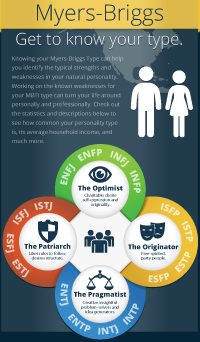Career Tips for INTP Personality Types (Introverted-Intuition-Thinking-Perceiving).
The MBTI® (Myers-Briggs Type Indicator®) can assist in the organization of a new career search by providing direction during the exploration process. This assessment was developed by Isabel Myers and Katharine Briggs, inspired by Carl Jung’s theory of psychological types. It classifies individuals into 16 different categories based on the characteristics of their identity. The Myers-Briggs® Test can identify connections between personality features and those of occupations, pairing an individual with those who are like-minded. There are trends among personality types that advise what type is propitious for certain careers than others. For instance, an outgoing, extraverted person will probably not be well-suited for a career in laboratory research, which requires many hours working alone. On the other hand, a detail-oriented introvert may not thrive in a highly social-based business or marketing environment whereas they are asked to meet with groups of individuals throughout the day. Following an occupation selection, there are four components of the career exploration process, with the first being goal setting, followed by gathering information, then networking, and finally, decision making. In accordance with the MBTI® type, each will approach these steps differently based on their natural personality function.
INTP Personality Types (Introverted-Intuition-Thinking- Perceiving) and Career Choice.

Read about The Myers-Briggs® Test INTP Personality Type Career Tips and other Occupational Information
INTPs are independent problem solvers who exceed at delivering an unbiased, accurate interpretation of thoughts and circumstances. This personality type is known to be intellectual, insightful, and self-sufficient. They are tolerant but dislike redundancy and prefer not to be involved with routine tasks. This personality type will enjoy occupations that allow them to work independently, using innovation to develop theories and principles. There are three categories of occupations that INTP personality types are inclined to inhabit. The first involves careers in the arts, specifically in the script. In addition, this personality type also enjoys occupations in technology or others in a classification of engineering/architecture. The reason for these trends is due to their proficiency in processing technical information and their preference for systematic investigation. Other careers to which INTPs are often most drawn are, Actuary/Risk Professional, Arbitrators, Mediators, and Conciliators, Architectural Drafters, Archivists, Art Directors, Food Science Technician, Geographer, Geoscientist, Librarian, or Network and Computer Systems Administrators.
INTPs are analytical problem solvers who have a deep understanding of conceptual design. This personality type also has little difficulty adapting to changing situations or environments. INTPs will typically place their energy focus in the direction of internal experience and concepts, extroverting their Intuition while introverting their Thinking. This personality type is profoundly curious about ideas, theories, and operational functions. Their value of intelligence and competence will spark their interest in finding solutions. INTPs are often seen in careers as top executives in fields that involve computers and mathematics or construction and engineering. They are also known to be top legal executives, computer software engineers, political scientists, and editors. Any occupation which allows INTP personality types to be logical, analytical, objectively critical, or insightful will be attractive options for them. Taking these personality behaviors in mind when selecting a career will shape the following steps in the career exploration process to be a much more enjoyable method of finding an occupation.
INTP Personality Types Goal Setting and Gathering Information.
Once career selection has been considered, the next step in the occupational exploration process is to set goals to achieve progress in the steps following in order to gain successful employment. INTPs will naturally set numerous long-term objectives but may not have a discernable course of action in order to reach their ambition. A useful tool for this step is to create a timeline with specific goals set in order to achieve their long-term aspirations. These specifics will allow for options among contrastive careers. For example, an INTP creating a timeline to weigh options considering law or computer science would include goals regarding education, internships, networking to build clients, and other occupational “mini-goals” in order to reach this destination.
This personality type will easily be able to utilize unanticipated possibilities, but once an opportunity presents itself, it may have difficulty taking defined action to further the previously set goals. Keeping their timeline updated in order to consider and improve goals based on these unforeseen opportunities will aid INTPs with this process. Once intent has been established, it will be standard reasoning for this personality type to read about future possibilities while finding which direction the prospective occupation is moving. Most will look for opportunities that allow for innovation and education. It is common for an INTP to miss important necessary information as a result of the number of options available. Many INTP personality types have a tendency to consider too many occupational choices and should determine which of their personal priorities carry the most weight. Composing a “short list” of careers that they find most appealing will narrow this step of the career exploration process and guide an INTP to the next phase. For example, they should start by creating a list of all possibilities and choose the top candidates from this larger list to create the “short list.” Researching positions at an online career database will also assist with gathering important facts in order to prepare this list.
INTP Personality Types and Networking.

Read about The Myers-Briggs® Test INTP Personality Type Career Tips and other Occupational Information
As an introvert, this personality type often has difficulty with networking. Still, it recognizes the fact that it is an invaluable step, and they should look to professionals for essential facts which will allow them to make a decision. INTPs are theoretical and abstract, interested more in ideas than in social interaction, and tend to focus their energy in the direction of internal experience and concepts. When networking, INTPs will hand-select a minute amount of experts to connect with and should widen their campaign by reaching out to close friends and family who can expose an INTP to more contacts that they have acquired over the course of their own careers. Without utilizing this valuable step, an INTP could miss potential prospects and settle for a less preferred occupation, leaving them discontented and unsatisfied. Once an individual with this personality type steps out of their comfort zone and does speak with professionals, they will have the ability to underline their capabilities and quick learning character without difficulty. INTPs should take caution to not appear confrontational when seeking clarification and utilize the “Oreo Approach” of agreeing first, offering a defense, and agreeing again. Sandwiching their critical feedback between two positive statements can be quite beneficial. Furthermore, having a realization that seeking collaboration is not a sign of incompetence will strengthen networking efforts. Although, when doing so, they have a tendency to appear repressed and should practice with friends and family before important connection engagements. Practicing with others can help this personality type to gain confidence and raise their voice. During these practice sessions, INTP personality types should highlight their strengths and avoid discussion of potentialities. When interviewing, remembering the interviewer may be a part of an opposite personality dichotomy will also be advantageous. For example, INTPs should beware of confounding Sensing personality types with eventualities. Preparing answers for questions relating to immediate contribution will be vital for this personality function. Networking is an extension of the gathering information step, and when performed properly, will allow for the next step, making an informed decision.
INTP Personality Types and Decision-Making.
Individuals with this personality type view every decision as an opportunity for education. As an INTP begins the decision-making step of this process, it will be in their innate behavior to perform a reasonable examination of their options. This personality type will generally begin with internal data, considering the impact the decision will have on themselves. They will habitually weigh the benefits and drawbacks of each alternative by making a simple “pros and cons” list. Due to their dominant function being driven by their Thinking preference, they may neglect their values and concentrate on logical options. More so, they will compare their options based on global impressions, seeking a decision that incorporates innovation. However, INTPs could find it helpful to look beyond the logical to the emotional, thinking about what is truly important and what will make them happy. INTP personality types will want to consider the environment and culture of the new occupation, as well as personal values such as commute. They should also take the time to talk through their options with family or partners who may be affected by their decision. It is also common for this personality type to postpone their career decisions, assuming a process will present itself, so setting a deadline that is announced to close friends and family is advisable. This date should be visible to an INTP daily. It is also important for this personality type to remember that taking risks can present possibilities that have not been considered and to not be overly concerned regarding unforeseen circumstances. Most importantly, this personality type should remember when it comes down to it; career changes are about happiness. They should take a step back and make decisions around long-term happiness and fulfillment, not just what makes the most sense in the immediate future. Utilizing the MBTI® will provide information that can focus a job search, connect with resources, and generally serve as a guide through the process of finding and deciding on a new career path.
Learn More About the MBTI® INTP Personality Type
Explore additional information that delves deeper into the INTP Personality Type by examining various personality and career-based subjects:
- How the MBTI INTP Type relates to Innovation
- How the MBTI INTP Type relates to Emotional Intelligence
- How the MBTI INTP Type relates to Leadership
- How the MBTI INTP Type relates to Project Management
- How the MBTI INTP Type relates to Decision Making
Click on the link below to read more about different MBTI Personality Types
| ISTJ | ISFJ | INFJ | INTJ | ESTP | ESFP | ENFP | ENTP |
| ISTP | ISFP | INFP | INTP | ESTJ | ESFJ | ENFJ | ENTJ |
References
Introduction to Type (Isabel Briggs Myers, 1998, CPP Inc.)
Introduction to Type and Careers (Allen L. Hammer, 2007, CPP Inc.)


